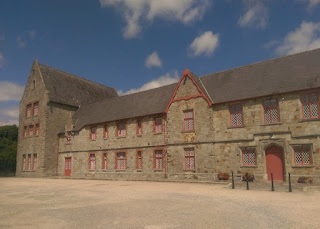26 January 2023
123 Years Ago Today... Dungarvan: a Deaf Repeat Offender - and a victim of Police Brutality?
21 January 2023
113 Years Ago... a Deaf Kerry Labourer dies; his will triggers a court battle over a small fortune
- 1901 Census, Laghtacallow - Census of Ireland 1901 online
- 1907 civil death record, Cornelius Corcoran - IrishGenealogy.com
- Google Maps
- 1910 Will Calendar, Cornelius Corcoran - http://www.willcalendars.nationalarchives.ie/
- 1880 Milltown Petty Sessions Order Books, 8 Nov 1880 - FindMyPast.ie
- The Kerryman, 22 May 1909
- Irish Independent, 19 Jan 1910
- Freemans Journal, 19 Jan 1910
- Dublin Daily Express, 19 Jan 1910
- Larne Times, 20 Jan 1910
- Irish Times, 22 Jan 1910
- Killarney Echo, 29 Jan 1910
16 January 2023
114 Years Ago... a Deaf woman brought to court by the workhouse master for assault
 |
| Source: Dundalk Democrat, 16 January 1909 |
Some workhouses at certain times had more than one Deaf inmate. Anne McEneaney was a Deaf inmate in Carrickmacross workhouse - but she wasn't the only one.
In 1909 a hearing woman, Bridget Finegan, who was living in Carrickmacross Union workhouse, brought Anne to the local Petty Sessions and accused her of throwing something at her head in the workhouse.
In court, one of the court staff wrote the evidence down for Anne. Anne replied "in a good hand" and cross-questioned Bridget; Anne had her own complaints - being 'interfered with' in the kitchen by Bridget and having milk stolen from her. The workhouse master was then examined; he felt that Anne was 'excitable' - because she was Deaf.
The official Petty Sessions order book states that the charge was proved, but the court felt that "having regard to the mental condition of defendant it is inexpedient to inflict any punishment" and dismissed the charge.
 | |
| Carrickmacross Petty Sessions Order Book, 1909; source: www.findmypast.ie |
Interestingly, Anne was declared by the workhouse master to be "not so bad as the dummy already committed to prison" in that same court recently. Who was the other Deaf person? Annie Eakins, who, the previous month, had been sentenced to three months imprisonment in Armagh gaol for assault and breaking glass in the workhouse. Both women were ex-pupils of St Mary's in Cabra - Anne McEnaney entered in 1881, and Annie Eakins in 1889.
Carrickmacross Workhouse is one of the few in Ireland that not only still stands but has been converted to a historic centre.







